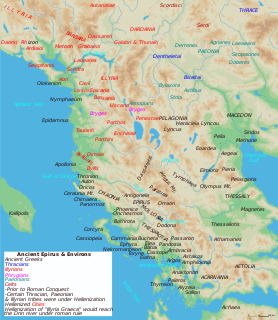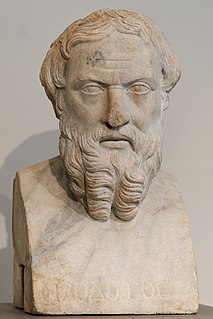 W
WThis is a list of cities in ancient Epirus. These were Greek poleis, komes or fortresses except for Nicopolis, which was founded by Octavian. Classical Epirus was divided into three regions: Chaonia, Molossia, Thesprotia, each named after the dominant tribe that lived there. A number of ancient settlements in these regions remain unidentified.
 W
W W
WThis is a timeline of ancient Greece from its emergence around 800 BC to its subjection to the Roman Empire in 146 BC.
 W
WThis article presents a list of people whom Herodotus mentioned in Book One of his major work The Histories. Herodotus presented his theme as "recording the achievements of both our own (Greek) and other peoples; and more particularly, to show how they came into conflict". Structurally, The Histories is sub-divided into nine books, each of which is sometimes named after one of the nine Muses. The work contains numerous digressions but the theme is constant. Although Herodotus' references range from the Trojan War of the 2nd millennium BC to the Peloponnesian War in his own lifetime, the essential scope of the entire work is a record of events from the reign of Cyrus the Great to the defeat of Xerxes I in 479 BC. Book One ends with the death of Cyrus.
 W
WThis list of kings of Epirus below includes all kings and queens, along with princes and princesses until the last representative of the royal Aeacid dynasty whereupon a democracy was established. In 168 BC Epirus became the Roman province of Epirus Vetus. The dates in parentheses indicate the reigning period if known.
 W
WThe current list of ancient Olympic victors contains all of the known victors of the ancient Olympic Games from the 1st Games in 776 BC up to 264th in 277 AD, as well as the games of 369 AD before their permanent disbandment in 393 by Roman emperor Theodosius I. It is based on available modern sources, as well as the older ones such as the writings of Pausanias and Chronicle of Eusebius.
 W
WJust how far back in history organized contests were held remains a matter of debate, but it is reasonably certain that they occurred in Greece almost 3,000 years ago. However ancient in origin, by the end of the 6th century BC at least four Greek sporting festivals, sometimes called "classical games," had achieved major importance: the Olympic Games, held at Olympia; the Pythian Games at Delphi; the Nemean Games at Nemea; and the Isthmian Games, held near Corinth. The Olympic Games were perhaps the greatest of these sporting events, and all Olympian victors were highly appreciated among the Greeks.
 W
WThe following is a list of winners of the Stadion race at the Olympic Games from 776 BC to 225 AD. It is based on the list given by Eusebius of Caesarea using a compilation by Sextus Julius Africanus. The Stadion race was the first and most important competition of the ancient Olympiads and the names of the winners are used by many Greek authors to date historic events.
 W
WThe ancient Greek tribes were groups of Greek-speaking populations living in Greece, Cyprus, and the various Greek colonies. They were primarily divided by geographic, dialectal, political, and cultural criteria, as well as distinct traditions in mythology and religion. Some groups were of mixed origin, forming a syncretic culture through absorption and assimilation of previous and neighboring populations into the Greek language and customs. Greek word for tribe was Phylē (sing.) and Phylai (pl.), the tribe was further subdivided in Demes roughly matching to a clan.